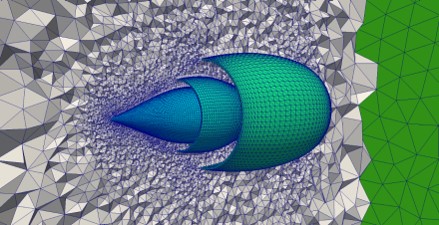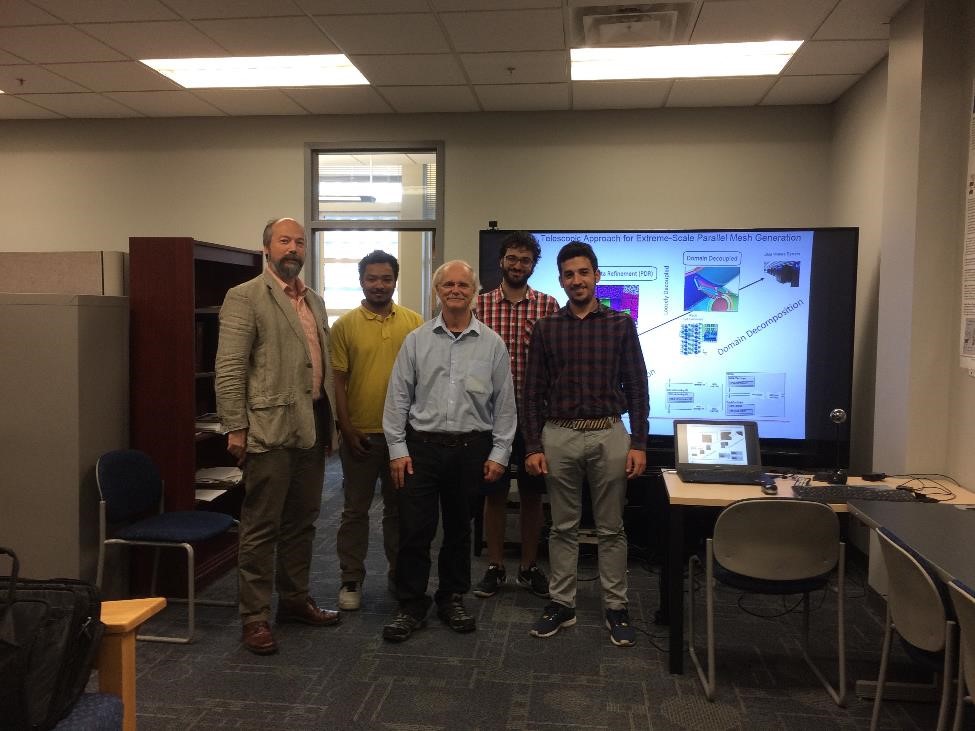Difference between revisions of "Main Page"
From crtc.cs.odu.edu
(→Extreme-Scale Parallel Mesh Generation) |
(→Extreme-Scale Parallel Mesh Generation) |
||
| Line 11: | Line 11: | ||
<li style="display: inline-block;"> | <li style="display: inline-block;"> | ||
[[File: SubGroup1.jpg|thumb|right|500px| '''CRTC Research Sub-Group for Extreme Scale Parallel Mesh Generation, from left to right: Nikos Chrisochoides, Kevin Garner, Dana Hammond (TM from NASA/LaRC), Christos Tsolakis and Polykarpos Thomadakis. ''']] | [[File: SubGroup1.jpg|thumb|right|500px| '''CRTC Research Sub-Group for Extreme Scale Parallel Mesh Generation, from left to right: Nikos Chrisochoides, Kevin Garner, Dana Hammond (TM from NASA/LaRC), Christos Tsolakis and Polykarpos Thomadakis. ''']] | ||
| − | We have assembled a team of established leaders that are currently developing state-of-the-art work | + | We have assembled a team of established leaders (see External Collaborators) that are currently developing state-of-the-art work on mesh generation and adaptivity issues relevant to NASA’s CFD 2030 Vision and will broadly impact end-user productivity of users throughout DoD and NASA. |
'''Objectives''' | '''Objectives''' | ||
Revision as of 21:39, 5 October 2017
Contents
Extreme-Scale Parallel Mesh Generation
Overview
Finite Element Mesh Generation is a critical component for many (bio-) engineering and science applications. The goal of this project is to deliver a novel Telescopic framework for highly scalable and energy efficient codes. Domain-and application-specific knowledge and run-time system support are combined to improve accuracy of FE computations.
We have assembled a team of established leaders (see External Collaborators) that are currently developing state-of-the-art work on mesh generation and adaptivity issues relevant to NASA’s CFD 2030 Vision and will broadly impact end-user productivity of users throughout DoD and NASA.
Objectives
- Design a multi-layered algorithmic and software framework for 3D tetrahedral anisotropic parallel mesh generation methods using state-of-the-art functionality supported by methods implemented in AFLR and CRTC’s telescopic approach for parallel mesh generation.
- Development of error-based metrics to drive an anisotropic adaptive process
- Design a power-aware parallel runtime software system for extreme-scale adaptive CFD computations including: (i) mesh generation & adaptation, and (ii) consistent error-based metrics for adaptation of any CFD discretization with localizable error estimates.

